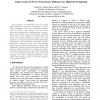Free Online Productivity Tools
i2Speak
i2Symbol
i2OCR
iTex2Img
iWeb2Print
iWeb2Shot
i2Type
iPdf2Split
iPdf2Merge
i2Bopomofo
i2Arabic
i2Style
i2Image
i2PDF
iLatex2Rtf
Sci2ools
123
click to vote
IPPS
2005
IEEE
2005
IEEE
Improvement of Power-Performance Efficiency for High-End Computing
Left unchecked, the fundamental drive to increase peak performance using tens of thousands of power hungry components will lead to intolerable operating costs and failure rates. Recent work has shown application characteristics of single-processor, memorybound non-interactive codes and distributed, interactive web services can be exploited to conserve power and energy with minimal performance impact. Our novel approach is to exploit parallel performance inefficiencies characteristic of non-interactive, distributed scientific applications, conserving energy using DVS (dynamic voltage scaling) without impacting time-to-solution (TTS) significantly, reducing cost and improving reliability. We present a software framework to analyze and optimize distributed power-performance using DVS implemented on a 16-node Centrino-based cluster. Using various DVS strategies we achieve application-dependent overall system energy savings as large as 25% with as little as 2% performance impact.
Distributed And Parallel Computing | IPPS 2005 | Memorybound Non-interactive Codes | Minimal Performance Impact | Performance Impact |
| Added | 25 Jun 2010 |
| Updated | 25 Jun 2010 |
| Type | Conference |
| Year | 2005 |
| Where | IPPS |
| Authors | Rong Ge, Xizhou Feng, Kirk W. Cameron |
Comments (0)

